Taxation and Business Development in Zanzibar: Insights from a Business Survey

The private sector is a critical driver of economic growth in Tanzania. The government has expressed a strong commitment to fostering a vibrant business environment while ensuring sufficient public resources for economic development. However, balancing taxation and business growth remains a challenge. This report presents findings from a survey of businesspeople in Zanzibar, examining their […]
Enhancing Food Security among Smallholders through Climate-Smart Agriculture in Tanzanian Arid Regions

Climate-smart agriculture (CSA) has been proposed as an approach to mitigate some of the threats emanating from climatic changes and guide agriculture management in the era of climate change. This study aimed to (a) assess the CSA practices and technologies and their impacts on household food security among smallholders in Tanzania’s arid and semi-arid agroecological […]
Assessing Small – Scale Fisher’s Use of Traditional Knowledge for Climate Adaptation in Southern Coastal Areas

The study aimed to assess small-scale fishers’ use of traditional knowledge for climate adaptation in Lindi and Mtwara regions located in the Southern Coastal areas of Tanzania. The study used a qualitative research approach wherein in-depth interviews, focus group discussions and observation were used to collect data. Climate change affects fishing activities since rainfall is […]
Evaluating Indigenous Knowledge in Reducing Tomato PHL in Morogoro Region: Case Studies from Mvomero and Morogoro Districts

Tomatoes are one of the most widely consumed vegetables in sub-Saharan Africa, valued for their essential vitamins and minerals. This study assessed the effectiveness of Indigenous Handling Practices (IHP) in reducing post-harvest losses (PHL) in the tomato subsector. Specifically, it examined indigenous handling methods, growers’ perceptions, and factors influencing the adoption of these practices. READ […]
Examining Funding Systems for Local Economic Development in Tanzania: A Key Component of Economic Structural Transformation

This study investigates the funding mechanisms that support Local Economic Development (LED) initiatives across seven regions in Tanzania: Kilimanjaro, Dar es Salaam, Mwanza, Kigoma, Iringa, Dodoma, and Mtwara. LED is recognized as a strategic approach to enhancing local economic capacities through decentralized governance, enabling local authorities to tailor initiatives to their communities’ specific needs. However, […]
Workshop Report: 28th Annual Research Workshop – 2024 “Pursuit for Sustained Growth and Trade Expansion”

REPOA’s Annual Research Workshop (ARW) continues to be the longest running and largest research workshop held in Tanzania by a Tanzanian organisation, where researchers, research users, and development stakeholders meet to discuss research findings, their associated implications for development policy in Tanzania and propose areas of further strategic research. The 28th REPOA’s ARW was conducted […]
Factors influencing Online Citizen Engagement at the Local Level in Tanzania
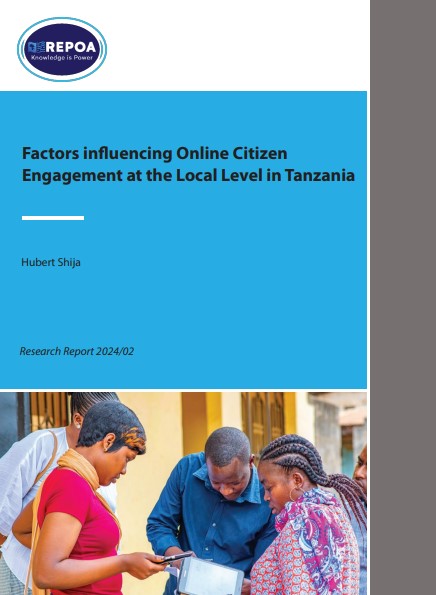
The adoption of e-participation adoption is found to be conditioned by the Information and Communication Technology (ICT) environment, government norms, ICT literacy and cost, and awareness among citizens and LLG leaders. The research implies that DOI power will increase when innovation testing is also included in the redesigning/ restructuring stage of the organisation’s innovation-decision process. […]
Democratisation in Tanzania: Re-examining citizens’ preferences for political party systems after 1992

The findings suggest an evolution of popular views on multipartism over time in contrast to reservations expressed to Justice Nyalali’s Commission in 1991. It is possible that, over time, many citizens have grown to prefer pluralism to a single party system because the speculated violence and societal division have not occurred. Also, they trust both […]
Motorcycle taxi riding and crimes in the urban settings of Dar es Salaam and Pwani Regions – Tanzania
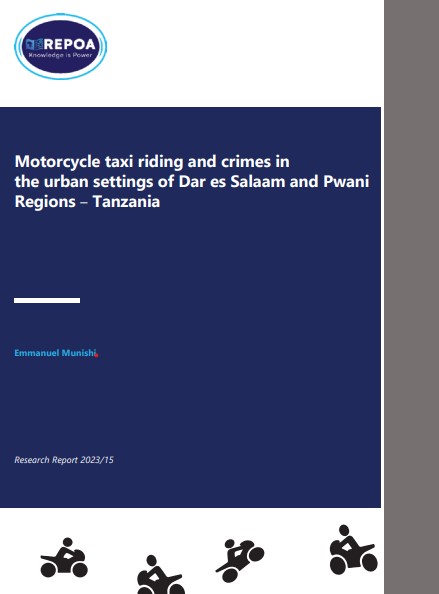
The study reveals differences in crimes between regions. Findings further reveal that, while different initiatives are used to cope with crimes by both riders and their customers, sometimes motorcycle riders have brutally assaulted people they suspect to be criminals, even without any proof, which escalates the problem. As for customers in Dar es Salaam, the […]
Technology Shocks and Performance of Commercial Banks in Tanzania
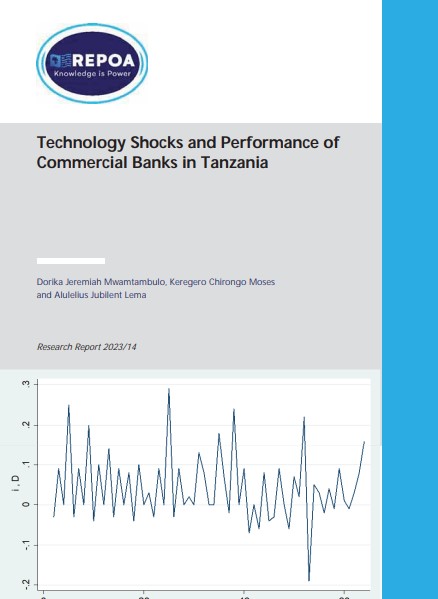
The findings proved the need for banks to formulate relevant policies and strategies for their technology adoption programmes. The goal is to ensure they are concurrent with the goal of profit maximisation and the maximisation of shareholders’ wealth. The study also takes the liberty of calling out for banks to support those investments pertaining to […]
Adaptive Water Governance and Climate Change Resilience among Rural Communities in Kilosa District, Tanzania
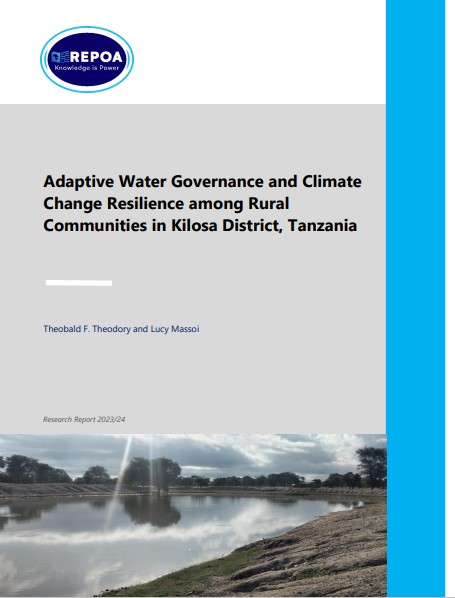
Results in this study indicate that climate change is not a new phenomenon in the study area. Rural communities have lived with it and observed extreme climatic events such as reduced precipitations, long drought seasons and shifting of seasons, to mention a few. Rural communities in Parakuyo and Mabwerebwere Wards enhance their climate change resilience […]
Closing the Gender Performance Gap at Enterprise Level: Empirical Evidence from Tanzania
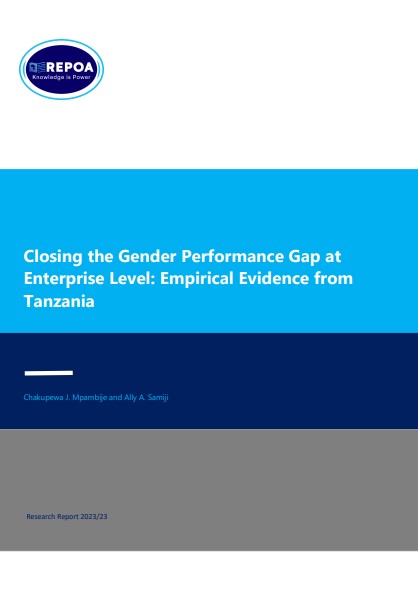
The findings of this study suggest that performance of women’s enterprises in Tanzania is determined by revenue, access to credit, levels of education, cost of labour and registration with the Tanzania Revenue Authority (TRA). Therefore, to close the gender performance gap, the government should increase access to credit, reduce cost of raw materials, provide education, […]
Vulnerability in the Context of the COVID-19 pandemic: a Case study of Motorcycle-Taxi Drivers in Dar es Salaam
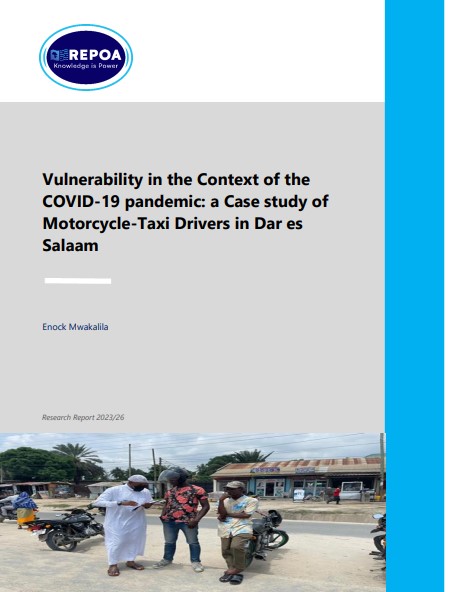
The Tanzanian Government can use the study results to better understand the vulnerability issues related to motorcycle taxis in the country and formulate practices and policies to minimize their vulnerability and maximize their benefits. This will include raising awareness of Covid-19 and related precautionary measures. READ ON…!
Factors Influencing Smallholder Tomato Growers’ Access to and Uptake of Climate Change Information in Iringa and Morogoro Regions
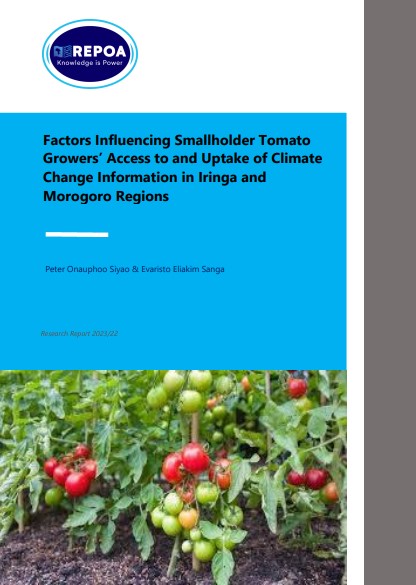
This study assesses the factors influencing access to and uptake of climate change information for building adaptive capacity through awareness creation among smallholder tomato growers in selected rural parts of Tanzania. The study seeks to answer the following research questions: what are the factors that encourage access to and uptake of climate change information by […]
Examination of the Sociocultural Barriers Facing Women Miners in Morogoro and Manyara
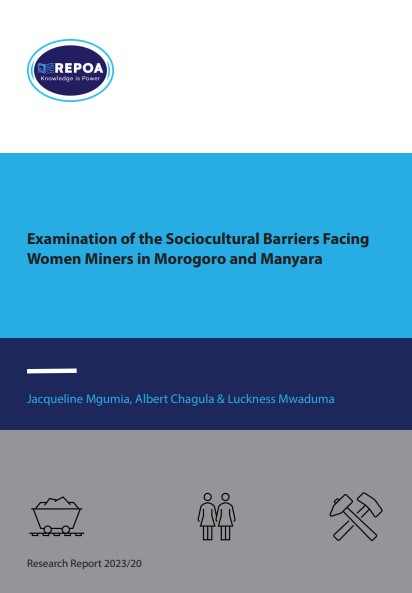
The findings of the study indicated that the patriarchal ideology, negative social attitudes and gender-based and sexual violence were the main sociocultural barriers facing women miners in Morogoro and Manyara. However, the women miners in Morogoro reported higher mean values than their counterparts from Manyara in the areas of negative social and cultural norms and […]
Post-Harvest Losses in Marketed fruits and vegetables: Evidence from selected markets in Dar es Salaam
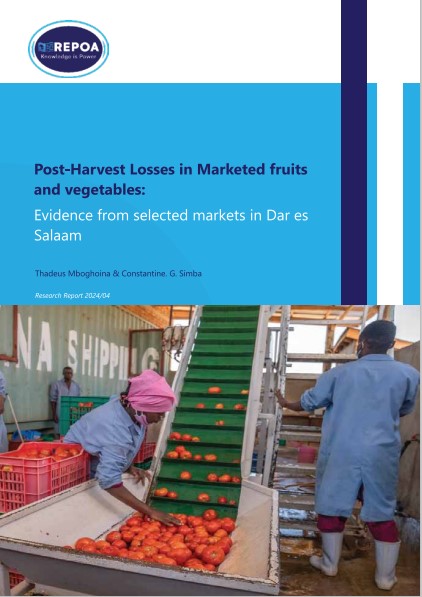
This study attempts to bridge the existing knowledge gap by focusing on post-harvest losses (PHL) in marketed fruits and vegetables in Dar es Salaam. There is arguably a limited but growing body of literature dedicated to studying PHLs in fruits and vegetables. There is even lesser attention, especially in developing economies, paid to losses incurred […]
